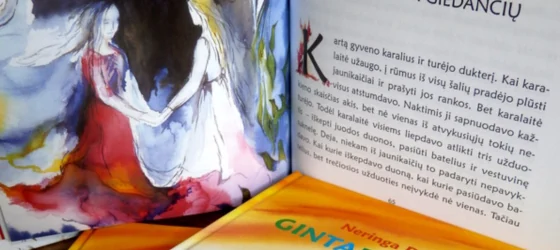
The European Court of Human Rights has ruled that classifying a book containing references to same-sex marriage as harmful to children is a violation of freedom of expression.
Perhaps you are familiar with “Amber Heart” (“Gintarinė širdis”), a collection of stories inspired by traditional fairy tales that explores themes such as discrimination and social exclusion, written by Lithuanian author Neringa Macatė. The book draws upon the traditional fairy tale model, with fantastical characters and motifs familiar to readers, but adapts them to current social realities. Thus, the book addresses themes such as tolerance, respect, diversity, and love in various forms, including same-sex relationships.

In 2013, shortly after the publication of “Amber Heart,” members of the Lithuanian Parliament reached out to the Lithuanian University of Education, which was responsible for distributing the book. Parliamentarians expressed concern about the book's content and topics. This concern was forwarded to the Office of the Inspector of Journalistic Ethics as a complaint.
In 2014, the inspector publicly stated that two stories, titled “The Three Princes’ Search for Wisdom” and “The Princess, the Shoemaker’s Daughter, and the Twelve Brothers,” could be potentially dangerous for children under the age of 14 because both stories featured same-sex couples getting married and living happily ever after. Under the law in force in Lithuania on the Protection of Minors against the Detrimental Effect of Public Information, any information that promotes a conception of marriage and family other than the one stipulated in the Constitution of the Republic of Lithuania or the Civil Code must be restricted.

Photo by Augustas Didzgalvis
Following this statement, the Lithuanian University of Education withdrew the book from public distribution, calling it “unscrupulous propaganda of homosexuality.”
When the author (pictured above) sued the University for its actions, it raised awareness of the limits of freedom of expression in Lithuania. And although the University eventually decided to resume distribution of the book, it imposed a parental advisory sticker on each copy sold, suggesting that the content could be harmful to children under 14. The author disagreed with this decision because she believed that the book was essential in helping children understand the challenges that some people face in Lithuanian society.
In 2015, the second edition of the book was published with the help of several local human rights defense organizations. However, lawsuits and disputes related to the first edition of the book have not yet been resolved. The author continued her fight in court.
In May 2019, after five years of legal battle, the author lost. The complaint she filed was rejected for the second time by the Supreme Court of Lithuania, with the final decision being definitive and unchangeable. Nevertheless, the author turned to the European Court of Human Rights in November 2019, seeking justice for freedom of speech and protection against discrimination. She also wanted to publish her book in the future.

It took four more years to see the European Court of Human Rights (ECHR) deliver its verdict, a historic decision in favor of freedom of expression, which, unfortunately, the author could not benefit from. She died in 2020.
The European Court of Human Rights examined the case from the perspective of freedom of expression. This right is protected by Article 10 of the European Convention on Human Rights. This stipulates any interference with this right must be prescribed by law, pursue a legitimate aim, and be necessary for a democratic society. The court recognized that the measure taken by the Lithuanian University of Education was prescribed by the Lithuanian Law on the Protection of Minors against the Detrimental Effect of Public Information. However, it was considered that this measure did not pursue a legitimate aim and was not necessary for a democratic society.
Thus, the European Court of Human Rights ruled in favor of the author. The court found that the advisory stickers on “Amber Heart” violated the author’s freedom of expression.
“The measures against the applicant’s book had intended to limit children’s access to information depicting same-sex relationships as essentially equivalent different-sex relationships,” the ruling reads.
The European Court of Human Rights also ruled that the book did not harm the protection of minors but, on the contrary, contributed to their education and development by presenting the diversity of family life and transmitting values of tolerance and respect. The court recalled that children have the right to receive age-appropriate and maturity-appropriate information and that parents cannot impose their religious or moral beliefs on their children to the point of depriving them of essential sources of information for their personal development.
“Restricting children’s access to such information had not pursued any aims that it could accept as legitimate,” the court’s ruling reads.
The court was also not convinced by the Lithuanian government’s argument that the book “promoted same-sex families over others.”
“To the contrary, the fairy tales advocated respect for and acceptance of all members of society in a fundamental aspect of their lives, namely a committed relationship,” the court’s decision reads.
The ECHR reminds us that same-sex marriage is not prohibited by international human rights law and is recognized by several European countries. It emphasizes that the right to marry and establish a family should not be limited to straight couples under Article 12 of the European Convention on Human Rights.
The ECHR recognized that states have a certain margin of appreciation to regulate same-sex marriages, but they must respect the principle of non-discrimination and ensure same-sex couples have effective legal recognition of their relationship. The ECHR thus affirmed the universal nature of human rights and the necessity of protecting freedom of expression for authors who defend diversity and equality.

Barbora Bukovská (pictured above), senior director for law and policy at human rights NGO Article 19, welcomed the court’s decision.
“Protection of children or public morals are too often used as a convenient pretext to restrict freedom of expression and demonize and discriminate against members of the LGBTQI+ community,” she said. “With today’s verdict, the European Court has rejected this kind of scaremongering tactic and made clear that it cannot be tolerated.”

Lithuania is one of the countries that does not recognize same-sex unions. The country has not yet legalized marriage equality and civil unions, and LGBTQ+ individuals face discrimination and stigma in society. According to a report by the EU Agency for Fundamental Rights published in 2020, only 19% of Lithuanians believe that LGBTQ+ individuals should have the same rights as straight individuals, compared to 91% in Sweden or 86% in France. Therefore, the ECHR decision is a major step forward in the recognition of freedom of expression and respect for family diversity in Europe.
The European Court of Human Rights has made a significant and historic ruling that classifying a book containing references to same-sex marriage as harmful to children is a violation of freedom of expression. Unfortunately, Neringa Macatė, the author of “Amber Heart,” did not live to see this victory. However, her fight for freedom of expression and protection against discrimination has not been in vain. This ruling sets an important precedent and highlights the necessity of respecting freedom of expression. This is especially true in cases dealing with critical social issues.
Following the author’s will, you can now download “Amber Heart” for free on her official website: amberheart.lt/.
Comments